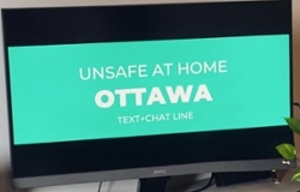
New text, chat service gets abuse victims help during pandemic
Ottawa Coalition to End Violence, along with Crime Prevention Ottawa, Interval House of Ottawa and the Eastern Ottawa Resource Centre, launched a text and chat service for survivors of violence and abuse
By Julie Ireton (CBC News - April 14, 2020)Dillon Black worries about the women calling shelters and resource centres during these times of self-isolation, looking for an escape from abuse — but also for those who aren't calling.
"Survivors aren't reaching out in the ways that they used to," said Black, prevention co-ordinator with the Ottawa Coalition to End Violence Against Women.
"Running errands, being able to go to the office, these were all opportunities where survivors would reach out for help in ways that are private and safe. And now they can't do that because they're stuck at home."
This is why the coalition, along with Crime Prevention Ottawa, Interval House of Ottawa and the Eastern Ottawa Resource Centre, has launched a new text and chat service.
Dillon Black, prevention co-ordinator at the Ottawa Coalition to End Violence, has been working to find a way for women to confidentially communicate with community services during their COVID-19 isolation. (Submitted)
'Encrypted' tech means data stays safe
Black went looking for best practices among others in the victims' services community across the country, eventually finding technology that had already been developed by an anti-violence worker in Victoria.
Black connected with them, then adapted the service to work in Ottawa.
"During the pandemic, they're actually making that platform available for free to violence-against-women organizations, because of the demand for this type of service," said Black.
Trained counsellors or support workers will be at the other end of the chat, helping callers create safety plans to reduce their risks, figure out coping mechanisms, find services or just talk about how they're feeling.
"It's an end-to-end, encrypted platform, and what that means is that no information is stored on a server," said Black.
"None of that information is saved, and the conversations are deleted automatically afterwards."
Decline in reports to police
At Interval House of Ottawa, executive director Keri Lewis says they're getting a few more calls than usual.
One support worker, Lewis said, has noticed clients communicating in different ways since self-isolation began in March.
"Because she has a cell phone, and clients can text her, she's getting a lot of referrals," said Lewis.
"Front-line workers around the city are seeing this need for people to be able to reach out in ways other than by phone, because it's really difficult to make a phone call when your abusive partner is in the house with you."
The Ottawa Police Service is seeing a decline in the number of abuse reports, however, as police Chief Peter Sloly noted during a virtual town hall last week.
"The abuse reports are concerning, because we know it's continuing and potentially increasing," Sloly said.
"For that reason, we've launched a number of public safety awareness campaigns targeted particularly at women, at young people and those who are most vulnerable to domestic abuse child abuse human trafficking."
'We needed to act quickly'
New federal money is also flowing to women's shelters and sexual assault centres across Canada, aimed at helping agencies that have often raised concerns about being underfunded and over capacity.
- Eastern Ontario shelters turning away 2 of every 3 fleeing abuse
- Hundreds of women fleeing violence turned away from shelters
"All we can do is provide options for people," said Lewis. "[The chat service] is new, but we felt really strongly that we needed to act quickly to give people options, because making phone calls is just not working for a lot of folks".
The text and chat line are available seven days a week, from 8:30 a.m. to midnight. People can text (613) 704-5535 or safely connect with help online at unsafeathomeottawa.ca.
If you're in immediate danger or you fear for your safety, call 911.

